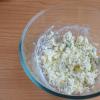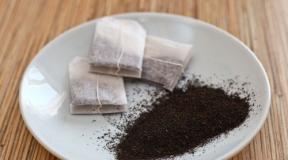Refined and unrefined vegetable oil, which is more useful, why oil is refined. Which olive oil is better refined or unrefined
Good day! Vegetable oils are present in every kitchen, and their range is simply huge. But how to choose the most useful and tasty from such a quantity, which will fill the body with health and bring pleasure in taste? To understand this, let's open the topic today: refined and unrefined oil - differences.
About refined product
Refined oil is one that has gone through a certain process of purification from all kinds of impurities.
Any vegetable oil contains polyunsaturated fatty acids, which make this product truly indispensable for the human body. After all, these substances build up the protection of cells against negative effects and destruction. The composition of the oils also contains vitamins and nutrients.
Oils are refined and unrefined. In ancient times, the second option was considered a product for the poor. In our time, everything has changed and the first oil just began to be considered not very useful - let's figure out why.
The usefulness of the product depends on its constituents, which during refining can change, depending on the stages of this process.
What is the purpose of refining? Basically, to deprive the product of taste and smell, making it neutral. This property is necessary for the preparation of various dishes, where additional flavoring and aromatic additions are not required, so as not to spoil the main note.
Another reason for refining is for use in frying, baking and any other heat treatment. After all, it is precisely such an oil that is intended to be harmless to health after such use, since an unrefined product, when exposed to high temperatures, contributes to the formation of harmful elements.
How oils are refined
In modern production, there are 2 types of vegetable oils refining:
- Physical using adsorbents.
- And chemical, where alkalis are used.
The second method is more frequent due to its simplicity, better development and easier control of the finished product.
According to the manufacturers, this method is absolutely safe for health, with the absence of any harmful impurities in the final product - the most harmless alkalis are used. This gives the oil the ability to rinse well with the absence of even traces of chemical elements on them.
Refining is carried out using a substance called Hexane (formula C6H14), which is part of gasoline - an organic element (solvent). It is a colorless liquid that does not dissolve in water - the boiling point is 67.8 degrees.
The process is as follows:
- Sunflower seeds are mixed with a chemical;
- Oil starts to separate from the product;
- Hexane is removed with water vapor, and the remaining mixture is treated with alkali.
After that, it remains to give the oil its proper appearance, for which it is deodorized and bleached using water vapor supplied by means of a vacuum.
The last stage - the finished product is bottled and then sent for sale to retail outlets.
Refined and unrefined oil - so what are the differences (convenient table)
These two types of vegetable oils have many beneficial properties for the human body, and yet they differ - so what is the difference:
| Refined product | Unrefined product |
| By production method | |
| Chemical method (extraction) using hexane or gasoline | Cold pressed or hot pressed |
| By cleaning method | |
| Additional technological methods | Filtration and mechanical cleaning |
| By consistency | |
| Softer composition | Fatter and richer |
| By smell | |
| Without smell | Preservation of natural aroma |
| By shelf life | |
| Longer shelf life | Shelf life is shorter |
| For the benefit of the human body | |
| Minimal benefit | Maximum useful properties |
As you can see from this table, refined oil is still inferior in some parameters to unrefined oil, but this is worth talking about in more detail.
Which is more useful

Let's start with a refined product. In fact, the refining process improves some characteristics, but in fact it turns out the opposite:
- The smoke point changes, amounting to +232 degrees (for unrefined +107).
And it seems like the question - in what oil to fry the food - is closed. But here is achieved the effect of breaking molecules of fatty acids, turning them into some kind of "freaks" - trans isomers or, in other words, trans fats. And due to the absence of such in nature, the body simply does not know how to behave with them and brings it out. As a result, they remain in cells that do not receive nutrition, damaging the membranes. All this eventually leads to the development of diseases such as atherosclerosis, ischemia, various neoplasms and hormonal disruptions. If you stop eating such oils, trans fats will leave the human body only after a year or two.
Therefore, frying even in refined oil is undesirable, especially with daily use.
- I would also like to say about the cosmetic field - such a product, added to a lotion or cream, can accelerate the aging process of the skin. This is explained by the action of free radicals formed in the refined product.
Now let's move on to the unrefined oil. First, it differs from the refined one by its pleasant smell and peculiar taste, which is successfully used in cooking. This is the most natural and useful product that also has healing properties.
But in order to preserve all the benefits, certain conditions will be required - it is not stored for long (probably the only drawback) and should be in a glass container in the dark and cool, or in a metal hermetically sealed jar. After the container has opened, it must be placed in the refrigerator.
From all of the above, it is clear that unrefined plant products are healthier than refined ones, which are more suitable only for frying, and even then they should not be abused.

Crude oil - production
Such a product is obtained from a plant-based natural base, without being subjected to additional effects (physical or chemical). Today there are 3 methods:
- Cold pressed, when ground seeds are subjected to a pressing process with a temperature of up to 40 degrees. This allows all useful substances to be stored in the finished product. But such oil does not last very long, increasing its price;
- With the hot pressing method, the raw material is first heated to 120 degrees, which allows to extend the shelf life, while maintaining all the benefits, aroma and color;
- The extraction method is considered the most inexpensive, but also not the most useful. This process uses a chemical solvent that is removed from the resulting oil.
Any of the above-described production methods is completed with a filtration process to get rid of various mechanical impurities.
Why is unrefined sunflower oil useful?
Cold pressing in the production of sunflower oil endows it with a large list of useful properties for the human body, allowing it to be used in folk medicine, cosmetology and, of course, in cooking.
With its regular use, the work of the central nervous system is restored, metabolic processes are normalized, the liver is cleansed and digestion improves. Such a product has a positive effect on brain cells and protects against the development of atherosclerosis.
Still unrefined sunflower oil rejuvenates the skin and has a preventive effect against the appearance of all sorts of neoplasms in the body.
The therapeutic effect extends:
- Metabolic processes.
- To improve memory and attention.
- The endocrine system.
- On the gastrointestinal tract, respiratory system and cardiovascular system.
- On cholesterol levels and the immune system.
Long-term use of such a product is able to cleanse blood vessels, remove bad cholesterol, prevent the development of CV diseases and normalize blood circulation in the brain.
Also, sunflower oil is an excellent prophylactic agent against rickets in children.
Video: refined or still unrefined? And can you fry on it?
Benefits of unrefined olive oil
It is not for nothing that people called olive oil “liquid gold”, because it has a lot of useful properties, having a large number of valuable elements in its composition:
- Oleic acid lowers blood cholesterol levels and appetite, and also speeds up metabolism and improves the functioning of the digestive system;
- Olive oil has a preventive effect against the development of CC ailments, strengthening blood vessels and making them elastic;
- The product has a positive effect on bone tissue, which is very beneficial for children;
- Linoleic acid in the composition of olive oil “deals with” the restoration of vision, including ensuring the normal functioning of all tissues, maintaining muscle tone and having a positive effect on the human psyche;
- The facial skin will also “say” thanks to this product, which is able to make it soft, silky and healthy, which provides vitamin E.
In the Mediterranean diet, unrefined olive oil ranks first, having a positive effect on the entire digestive system.

Why is unrefined linseed oil useful?
The oil obtained from flax seeds contains a very important acid for the body - alpha-linoleic acid, which belongs to polyunsaturated fatty acids (Omega-3). In addition, the product contains many vitamins (E, A, F and K).
The unrefined method of production makes the oil a little bitter in taste, while endowing with a large number of useful properties that you will feel after at least 2 months of regular intake:
- Flaxseed oil promotes the process by reducing appetite and improving the performance of any diet.
- The benefits of the product extend to the CVS, making blood vessels more elastic and stronger, normalizing blood pressure, lowering cholesterol levels in the blood and preventing heart attacks (especially repeated ones).
- Helps relieve constipation, hemorrhoids and diverticular disease. If you use it on an empty stomach, you can heal from colitis and gastritis, as well as worms and liver diseases. There is also the prevention of the development of gallstone disease and kidney stones.
- With the help of unrefined linseed oil, inflammation is relieved in case of lupus, mastopathy (fibrocystic) and gout. The product helps the body to better absorb iodine.
- Flaxseed oil is indispensable for improving the appearance, helping to reduce the secretion of the sebaceous glands, unclogging the pores. And the use of oil in the form of masks rejuvenates, softens and vitaminizes the skin and hair. The increased content of vitamins improves the functioning of the central nervous system and other systems, reducing the risk of blood clots, atherosclerosis, hypertension and stroke.
- Flaxseed oil has a preventive effect against skin, breast and colon cancer. Elements such as lingins reduce the spread of tumors, regardless of their location.
- These same substances are very useful for the female body, activating the normal hormonal balance. Taking this product will reduce the unpleasant symptoms of menstruation and menopause.
Flaxseed oil also fights edema and inflammation of the prostate gland in the male population of our planet, curing infertility and impotence.
Other vegetable oils
I would like to tell you a little about coconut oil, which is a staple food in countries such as Thailand, India and Indonesia.
This product also has many medicinal properties that are used in traditional Indian medicine (Ayurveda). In Cleopatra's time, it was added to baths to preserve beauty and youth, which is why coconut oil is still popular among the female population of Southeast Asia and India.
And another interesting butter is shea, extracted from the shi tree of the same name (Africa). From its fruits, oil is produced, which has been used by local folk healers for centuries.
The result of pressing is a solid composition of a non-uniform consistency from cream to white, used in the field of cooking, cosmetology, aromatherapy and medicine.
It is an environmentally friendly product with protective, emollient and moisturizing functions. The rich vitamin composition maintains the normal condition of the skin, renews cells and rejuvenates the body, prevents the development of cancerous tumors due to its antioxidant properties and improves microcirculation.
Cosmetology and unrefined oils
The use of vegetable oils in the field of cosmetology began a long time ago, starting with the rapid development of this industry. With the help of such means, a large number of cosmetic defects and problems are solved. Their uniqueness lies in the versatility of application, with the possibility of selection for any type of facial skin, including the area around the eyes.
- Heated vegetable oil effectively cleanses the face without overdrying. And creams based on them are suitable for use in winter, protecting and nourishing the skin.
- For dry and normal skin, masks with vegetable oils add elasticity, while smoothing wrinkles, cleansing and relieving inflammation.
- Lip balms also contain oils, making them softer and protecting against cracks, viruses and bacteria.
- For nails, you can make baths with the addition of unrefined vegetable oil, which helps to strengthen the nail plate.
- There are oils that are very useful for hair, stimulating hair growth and getting rid of dandruff.
- Massage therapists have been using vegetable oils for their sessions for a long time, enriching the composition with essential products, which is also used in aromatherapy.
I would like to offer you a small list of different oils with the designation of the desired area of \u200b\u200btheir application:
- Olive, sea buckthorn, macadamia, wheat germ, avocado, cocoa and rosehip oils are designed to improve the quality of dry and aging skin;
- Peach, castor and avocado oils are suitable for very sensitive and prone to allergic skin;
- If the skin is prone to inflammation and problematic, it is preferable to use pomace from jojoba, hazelnut, grape seeds, flax, sea buckthorn and mustard;
- Sesame seeds (read about) and grape seeds are more suitable for oily skin;
- Another oil obtained from grape seeds is useful for treating lips, which can also be lubricated with jojoba oil and walnut;
- Castor herbal product, burdock, peach and olive, perfectly cares for hair.
And these are not all oils that are used in cosmetology. Their popularity is explained, in addition to the mass of useful properties, also by safety - after all, it is almost impossible to harm them. The main thing is to choose the right product based on the problem.
All that remains is to start using vegetable oils for the benefit of your health, beauty and mood.
That's all - see you soon on the pages of our blog! I would like to remind you to invite friends to us on social networks and share with all the new information received.
Mini tips for losing weight
Reducing portions by a third is what will help you slimmer! Briefly and to the point :)
Should I put on supplements or stop? When this question arises, it's definitely time to stop eating. This organism gives you a signal of imminent saturation, otherwise you would have no doubt.
If you tend to overeat in the evening, take a warm shower before dinner. 5-7 minutes, and you already have a completely different mood and attitude towards food. Try it - it works.
No matter how delicious the food is, you will eat it many more times. This is not the last meal of your life! Remind yourself of this when you feel like you can't stop and swallow tightly piece by piece.
The environment affects us - that's a fact! Avoid conversations like “I lost weight here, and I couldn't”, “but we will still remain fat”, “there should be a lot of good people”. Well, let there be "many" of them - but what have you got to do with it?
Remember a simple word: graceful. This is exactly what your portion of dishes harmful to the figure should be. And then you too will become graceful - it's only a matter of time.
To reduce the likelihood of overeating, stick to the "10 calm spoons" rule. It says, "Eat the first ten spoons very slowly, as slowly as you can."
Do 10-20 squats each time you open the refrigerator door. It can be normal, or with the direction of the feet and knees to the sides. Or on one leg. Or squat and then jump. In short, be more varied.
Learn to catch the moment when the taste of food dulls, as if it becomes less tasty. It is at this time that you must stop eating.
Before you eat, tell yourself: "As we eat, I will lose weight!" A very powerful phrase for reducing appetite and regulating food composition.
Occasionally have a Big Salad Day. A huge bowl of vegetable salad (or better a bowl!) Should be eaten during the day. The rest of the food - only after an impressive portion of the salad.
A minute of exercise before meals will reduce your appetite better than any special remedy.
Start in your refrigerator "Shelf for slim" and "Shelf for fat". Which one do you choose?
To reduce appetite, drink a glass of kefir before each meal.
You may also be interested
On sale you can see olive, sunflower, soybean, corn, peanut, sesame, rapeseed, palm oil. What is the difference between these products and what should be guided when choosing one or another?
Vegetable oils are the most common fat used in the diet. They are extracted from finely ground heated seeds and fruits by pressing (squeezing) or extraction. Due to their composition, vegetable oils are physiologically very active, and their nutritional value is determined by the content of polyunsaturated fatty acids in them, which our body needs to build cells. That is why vegetable oils should certainly be included in the diet of a person of any age, even a baby.
Sunflower oil
Sunflower oil is widely used as the main raw material in the production of margarine and mayonnaise, as well as in the manufacture of canned vegetables and fish. Sunflower oil goes on sale refined and unrefined; Refined oil is also deodorized, that is, odorless. Refined sunflower oil is transparent, golden or light yellow in color, does not emit sediment during storage, has a faint smell of seeds. Unrefined oil is darker in color and has a strong specific odor, and forms a sediment during storage.
Corn oil
Corn oil is light yellow, transparent, odorless. It goes on sale only in refined form. It does not have any particular advantages over sunflower or soybean oil, however, this oil contains a greater amount of useful accompanying substances, which makes it more popular.
Soybean oil
Soybean oil is very popular in Europe, America and, of course, in China. In China - by virtue of tradition. Soybean oil is loved for its characteristic smell and taste. It is extracted from soy beans, which, in addition to a significant amount of oil - 15-20%, contain complete proteins. Soybean oil is refined, but not deodorized. Crude (unrefined) oil is brown with a greenish tint, refined oil is light yellow.
Soybean oil is better than others for baby food, as it contains substances necessary for the formation of the central nervous system and the visual apparatus. It is similar in composition to fish oils: they contain the same polyunsaturated acids.
Cottonseed oil
Cottonseed oil is golden yellow in color, has a faint taste and smell. It goes on sale refined. It consists of a mixture of liquid (70-75 and solid (25-30 fats. When stored, the latter form an abundant flocculent sediment. When cooled to 0 ° C, cottonseed oil completely solidifies, and upon subsequent heating melts and becomes transparent. Cottonseed oil is used in mainly in the hot processing of various products.For dressing salads, a special salad oil is produced: solid ingredients are removed from cottonseed oil by freezing.
Olive oil
Olive oil is obtained from the pulp and seeds of the fruit of the olive tree. The pulp contains up to 55% oil. The high quality olive oil is called Provencal. The best varieties are light or golden yellow in color. It is most loved by Italian chefs who prepare sauces on it. The lower grade oil has a greenish tint.
Olive oil has a special place among others. It is most valuable and nutritious. The percentage of fatty and polyunsaturated acids in it is not so high, but it is absorbed better than others. In our country, it is not produced, and it costs much more than any other. The high cost of the product is also due to its special properties, due to which olive oil is often introduced into medicines and cosmetics: lotions, creams, etc.
Olive oil is well tolerated even by people suffering from digestive disorders, liver and gallbladder diseases. Moreover, doctors even recommend such patients to take a spoonful of olive oil on an empty stomach in the morning. It has a mild choleretic effect. A spoonful of sunflower oil in a similar situation can provoke hepatic colic.
Olive oil prevents cardiovascular disease. It has been established that the inhabitants of the Mediterranean rarely suffer from cardiovascular diseases due to the so-called Mediterranean diet, which includes many vegetables, fruits and fish, but little meat and butter. The main source of fat there is olive oil.
Olive oil, like any other oil, can be refined, that is, refined. As a rule, oil of not very high quality is refined. It is most commonly used in cooking. Connoisseurs value unrefined natural olive oil. It has a specific smell and taste, in general, unusual for our consumer. But it is this oil that is most valuable and nutritious. It is ideal for preparing vegetable, fruit and vegetable and fruit salads, crab and shrimp snacks. Excellent hot dishes are obtained in olive oil; it is used in the production of canned fish.
Real olive oil can be easily distinguished from fakes and surrogates by putting it in the refrigerator for several hours. In natural olive oil, white flakes are formed in the cold, which disappear at room temperature.
Peanut, sesame and canola oils
Peanut, sesame and rapeseed oils are among the least beneficial vegetable oils. They have much less polyunsaturated acids and a relatively large amount of fatty acids with a large molecular weight. These products are used abroad for the production of margarine products and canned food, as well as for the preparation of salads and frying - for the same purposes as all vegetable oils.
Palm oil
Palm oil is the least valuable of all vegetable oils. It is solid in consistency and looks like pork fat. It is used for cooking in a number of Eastern countries, where, for religious reasons, pork fat is not used. In most countries, this product is used as a hardener for the preparation of margarines, in the culinary and confectionery industries. Palm oil is eaten only when heated - it is not suitable for cold cooking.
What is refined oil
Refining is the purification of oil from various contaminants: residual pesticides and other harmful impurities. The oil is treated with alkali, free fatty acids and phospholipids are removed from it; the product separates, the refined oil rises. Then it is washed and filtered again. It cleans up, but almost loses its taste and smell. It is for this reason that not everyone likes refined oil. Some people prefer the smell and taste of a natural product and believe that cleaning is detrimental to it. But it should be borne in mind that we eat vegetable oil every day, and if some harmful substances remain in it, then, gradually accumulating in the body, they can contribute to the occurrence of various diseases. Therefore, refining is necessary at least for safety reasons. In addition, during refining, only a small part of nutrients is lost, so that in terms of nutritional value, refined and unrefined oil are approximately equal.
No taste, no color, no smell
If you take different vegetable oils: sunflower, corn, soybean, olive, cottonseed, etc. and refining them completely, you cannot tell them apart. These will be absolutely identical viscous liquids, lighter than water, without taste, odor and color - the so-called impersonal oils. Their nutritional value is determined only by the presence of essential fatty acids (mainly linoleic and linolenic). These acids are the most important thing that refined vegetable oil contains.
Essential fatty acids, also called vitamin F, are responsible for the synthesis of hormones and the maintenance of immunity. They give stability and elasticity to blood vessels, reduce the body's sensitivity to the action of ultraviolet rays and radioactive radiation, regulate smooth muscle contraction, and perform many more vital functions. These beneficial substances in the oil are preserved even after deep refining. To make the oil clear, phospholipids (or phosphatides) are removed from it.
Let's understand the terms
According to the degree of purification, the oil can be:
* unrefined - only mechanical impurities are removed;
* hydrated - filtration and hydration (water treatment to remove phosphorus-containing substances) was carried out;
* refined non-deodorized - filtration, hydration, neutralization (alkaline refining), bleaching (discoloration)
* refined deodorized - the oil has passed all the previous operations of refining and deodorization.
There are several stages of refining.
* The first is getting rid of mechanical impurities. After going through this procedure, the oil goes on sale as a commodity unrefined.
* The next step is the removal of phosphatides (hydration). Such processing makes the oil transparent, after which it is called marketable hydrated.
* The third step is the elimination of free fatty acids. With an excess of such acids, the oil develops an unpleasant taste. The oil that has passed these three stages is called already refined non-deodorized oil.
* After bleaching (fourth stage), there are no pigments left in the oil, including carotenoids, and it becomes light straw. Deodorization removes volatile compounds, deodorizes the oil and turns it into a refined deodorized oil.
* And, finally, the last stage of cleaning, during which a colorless, viscous liquid is obtained - freezing, with its help wax is removed.
After going through all the stages, the oil becomes impersonal. Margarine, mayonnaise, cooking fats are made from such a product, and used in canning. Therefore, it should not have a specific taste or smell in order not to disturb the overall taste of the product.
On the shelves, sunflower oil most often gets either refined, non-deodorized - outwardly transparent, but with a characteristic smell and color.
Or refined deodorized - very transparent, light yellow, odorless and tasteless of seeds.
Or unrefined - it is darker than bleached, maybe with sediment or suspension, but nevertheless it passed filtration and, of course, retained the smell that we all know from childhood.
Based on materials from the "Demand" magazine
For Russians, the most traditional vegetable oil is sunflower. It is made from the annual oil seed sunflower. This heat-loving and light-loving plant from southern Mexico has successfully taken root in Europe. Currently, sunflower plantations account for 70% of the world's crops. Products extracted from the plant, including unrefined sunflower oil, have absorbed the beneficial and nutrients concentrated in sunflower from the surrounding nature.
In contact with
The product is obtained from annual sunflower seeds by cold or hot pressing and extraction. cold pressing is also called press. It can also be obtained at home. Hot pressing and extraction are carried out in oil mills. The production process consists of several stages:
- preparation of raw materials (cleaning seeds from litter, dehulling, separation of kernels and husks);
- crushing the kernels in the rollers, getting the "mint";
- wringing out the oil with a press;
- dissolving the pulp obtained after pressing with organic solvents;
- distillation (extraction) of the oil substance from the solution and the solid residue (micelle and meal) in the extractor.
The squeezed derivative is subjected to settling or purification from accompanying impurities (refining). There are several cleaning methods (chemical, physical, mechanical), as a result of which the color, smell, density and other qualities of the product change.

Unrefined oil has a deep dark yellow color
In the manufacture of cold-pressed sunflower oil, heating is sometimes used. The seed kernels passed through the rollers, the so-called. mint, stacked in baking trays and heat treated at a temperature of 45 ° C. Further, under high pressure, seed juice is released, which is then sent to the sediment and storage.
When cold pressing, the use of any chemical treatment, the addition of preservatives and the temperature rise above 45 ° C are not allowed. Excessively overheated sunflower raw materials will give the product a burnt taste and smell, and will deprive many useful components. Sometimes manufacturers raise the heating temperature of raw materials to 90 ° C. Hot pressing accelerates the pressing process and increases the product yield, while cold pressing leaves 20-30% of the oil component in the cake.
Unrefined cold-pressed varieties have a pleasant taste and aroma of roasted seeds, an oily substance that gently envelops the mouth and throat when swallowed.
The presence of the inscription "Extra Virgin" on the label is a guarantee that it is a cold pressed unrefined product.
What is the difference from refined?
When starting cooking, housewives should understand the difference between refined sunflower oil and unrefined sunflower oil. The purified product does not have a smell and a pronounced taste of seeds, therefore, when dressing salads and canned food, when frying and adding to the dough, it does not affect the taste and smell of dishes. Refined varieties last longer and cost less.
Difference between refined and unrefined sunflower oil in chemical composition. During the cleaning process, many useful substances are lost, which reduces the healing properties.
Unrefined sunflower oil is not inferior in useful qualities to olive, soybean, corn.
Composition
 Unrefined sunflower oil contains a large amount of fatty acids. Their average molecular weight is about 290 atomic units. A large share belongs to omega-9-oleic (25-40%) and omega-6-linoleic (45-60%) acids. Also, the unrefined product contains palmitic, stearic, myristic, arachidic, omega-3-linolenic acids.
Unrefined sunflower oil contains a large amount of fatty acids. Their average molecular weight is about 290 atomic units. A large share belongs to omega-9-oleic (25-40%) and omega-6-linoleic (45-60%) acids. Also, the unrefined product contains palmitic, stearic, myristic, arachidic, omega-3-linolenic acids.
Unrefined varieties are famous for the fact that they contain vitamins that are preserved during the cold pressing process. So α-tocopherol (a substance of vitamin E), is contained in an amount of up to 70 mg / 100 g. In olive oil, this figure is up to 24 mg / 100 g.
It is a powerful neuroprotector and antioxidant, it protects cell membranes from breakage as a result of oxidation, stabilizes mitochondria, regulates metabolic processes and immunity, and reduces the risk of malignant tumors. Another important vitamin found in unrefined oil is K.
Benefit for health
The benefits of unrefined sunflower oil are due to its composition. The combination of vitamins and fatty acids allows it to have the following effects:
- regulate fat metabolism, speed up metabolism, as a result of which "harmful" cholesterol and excess weight are reduced, the regeneration of muscle and bone tissues is improved;
- improve the work of the cardiovascular system and the brain (prevents degenerative changes, memory loss), strengthen the walls of blood vessels;
- reduce blood viscosity and the threat of blood clots;
- help the formation of cell membranes and nerve fibers;
- improve liver function and digestion, eliminate constipation;
- strengthen immunity;
- prevent premature aging;
- and nails;
- improve the work of the endocrine and genitourinary systems.
Unrefined sunflower oil is not only beneficial but also harmful if consumed excessively.
Which is healthier - refined or not?
Traditionally, the question of which sunflower oil is healthier, refined or unrefined, is answered by giving preference to the latter because of its greater naturalness. However, not all so simple.
A specific taste and smell are created due to the presence of impurities in the product - pigments, odorizing substances, soaps, natural impurities. When used systematically, these substances can have a negative effect on the body.
In addition, the answer to the question of which sunflower oil is better, refined or not, depends on the purpose of its use. For frying, baking and preserving with heat treatment, peeled varieties are preferred. They do not lose their quality when heated, do not disturb the taste and smell of cooked food. In addition, the shelf life of unrefined oil is much shorter. If the hostess stores food for a long time, it is better for her to prefer peeled varieties.
Is oil treatment effective?
 Treatment with unrefined sunflower oil must be agreed with a doctor after a preliminary medical examination. Dosing is an important aspect of any therapy. In the amount of 20-50 g (up to 3 tablespoons), the unrefined product has a therapeutic effect, in a higher dose it can have the opposite effect.
Treatment with unrefined sunflower oil must be agreed with a doctor after a preliminary medical examination. Dosing is an important aspect of any therapy. In the amount of 20-50 g (up to 3 tablespoons), the unrefined product has a therapeutic effect, in a higher dose it can have the opposite effect.
There are many recipes for healing mixtures of traditional medicine with the addition of olive or sunflower oil. For medicinal products, it is assumed to use only unrefined product. In some cases, just a spoonful of oil is helpful.
How to use?
In order not to harm your health, you should know how to use unrefined sunflower oil. You should not use it more than 20-50 g per day, so as not to disrupt the lipid balance of the body and not gain excess weight. To achieve a healing effect, the intake must be regular.
Since the oil contains vitamins that are easily destroyed when heated, it makes no sense to use an expensive medicinal product when frying, baking and canning. Although there are recipes that recommend adding a lot of oil to the jar before seaming without further sterilizing. The most common and correct way to use an unrefined product is to dress in vegetable salads.
Can you fry?
 Choosing culinary recipes, housewives decide whether it is possible to fry in unrefined sunflower oil. If there is no other option, then as an exception, once, you can. It should be borne in mind that vitamins will not be preserved, the taste and color of the oil will change, and the taste properties of the fried dish will also change. Some types of fish do not match the taste of unrefined varieties, and frying vegetables will spoil the taste of the soup.
Choosing culinary recipes, housewives decide whether it is possible to fry in unrefined sunflower oil. If there is no other option, then as an exception, once, you can. It should be borne in mind that vitamins will not be preserved, the taste and color of the oil will change, and the taste properties of the fried dish will also change. Some types of fish do not match the taste of unrefined varieties, and frying vegetables will spoil the taste of the soup.
Culinary specialists need to clearly understand why it is impossible to fry in unrefined sunflower oil all the time. Substances dissolved in oil, when heated, change their structure, break down, turn into toxins and carcinogens.
Potential harm from use
The main point limiting the dose of unrefined varieties is the high calorie content (890 kcal / 100 g) and the presence of a large amount of fat (99.9 g / 100 g). It is undesirable to eat more than 3 tablespoons a day. Otherwise, the body's fat balance, the work of its internal organs and systems will be disrupted, and weight will increase.
During the frying process, toxins harmful to the body can be formed. People suffering from chronic diseases (hypotension, blood clotting, gallbladder problems, etc.) should consult a doctor about the permissibility of using the oil or about reducing the dose. With some anomalies in the body, the positive properties of the product turn into negative ones. There are cases of allergy to sunflower oil ingredients. In addition, an expired product will cause harm.
Shelf life and storage
The shelf life of unrefined sunflower oil, especially not mechanically refined, is rather short. It easily sediment and cloudy.
It should be clearly remembered how long unrefined sunflower oil is stored. After opening the package, the product must be used within a month. It should be stored in glassware in a dark place at a temperature range of 5-25 ° C. If the color, smell and taste have changed, the product should be abandoned.
Today everyone knows about the benefits of vegetable oils, and we have plenty to choose from: the assortment is so rich that buyers of the previous, "Soviet" times could not imagine that there are so many types and varieties of vegetable oils in the world, and surprisingly tasty and healthy ...
A person needs vegetable oil for good nutrition, as it contains polyunsaturated fatty acids that protect our cells from negative influences and destruction, as well as many vitamins and nutrients.
And how to choose the right oil from all this abundance that will really benefit?
First of all, any oils are used to be divided into refined and unrefined. And if earlier, several decades ago, unrefined oil was considered almost a product for the poor, today the situation has changed dramatically, and it is unrefined oils that are considered the best and most healing ones, and they say about refined oil that nothing useful remains in it. Where is the truth?
The usefulness of vegetable oil depends mainly on its composition, the ratio of fats and acids, and these parameters remain practically unchanged even after refining. So, the benefits of oil should not be judged from this point of view. Nevertheless, the stages of refining are also different, and this is where you need to learn to understand.
Why is oil refined?
Why is oil refined if this does not affect its composition? First of all, this is done in order to make it neutral, almost tasteless. This may seem completely unnecessary, but you should not generalize too much - after all, oil in cooking is used to prepare many dishes, moreover, completely different, both in composition and in the method of preparation. It is better to season salads and some snacks with unrefined oil, since these dishes are not cooked, moreover, the oil will give the salad an additional flavor.
If vegetable oil is used for cooking hot dishes, for frying or baking food, then unrefined oil can do more harm than good - due to the formation of smoke, burning, foam, unpleasant smell and taste. Unrefined oil, when overcooked, can also contribute to the formation of certain harmful substances in food, especially at high temperatures.
Oil refining methods
Vegetable oil in modern industry is refined in two ways: physical and chemical. The physical method usually involves the use of adsorbents, and the chemical one - alkalis. The chemical method is most often used, because it is simpler, better developed, and the quality of the resulting product is also easier to control.
Manufacturers of oil refined in this way assure that consumers have nothing to fear, and no harmful impurities are included in the final product, because the safest alkalis allowed for food processing are used in production. In addition, the oil is well washed, and even traces of chemicals are not left in it. I really want to believe that this is actually so ...
What is the difference between refined and unrefined oils?
Refined oil differs from unrefined oil not only by its taste, or rather by its absence, but also by the fact that it does not smoke and does not form foam when cooking hot dishes.
Frying in oil
At the very least, for the refined oil to start smoking, the pan must be hot enough. The temperature at which a particular oil starts to smoke is considered the smoke point, and it must be said that it is different for different oils.
In the process of frying, if the oil smokes and burns, carcinogens are formed, and everyone has heard about their dangers. For example, acrolein, the simplest aldehyde, formed in vapors over a hot frying pan, has a toxic effect on the mucous membranes of the eyes and irritates the respiratory tract, which leads to the development of various inflammatory diseases.
If the cook constantly breathes acrolein fumes while cooking, then in the end he will acquire a whole bunch of chronic diseases, besides, the quality of the prepared dishes will be far from the best. So you only need to use refined oil for frying, and do not overheat the pan.
Other harmful substances, such as fatty acid polymers and free radicals, are also formed at the point of smoke of oils, and they remain in the composition of cooked dishes. If you often eat such dishes, then this can lead to chronic health problems, including the development of oncology.
The brown crust on the roasted potatoes we love so much contains acrylamide, a substance that is also carcinogenic and can even destroy DNA. Most acrylamide is produced when potatoes are deep-fried for a long time, like they do at McDonald's.
What is not contained in overcooked meat or fish: heterocyclic amines that can cause heart disease are formed inside the piece, and polycyclic carcinogens with a large amount of carbon are formed in a burnt roast. Most often, this happens if the oil is not used for the first time, and the pan gets very hot.
The next carcinogens that are often formed during frying are peroxides, and most of them are formed during frying in sunflower oil, which is so widespread in Central Russia. Therefore, it is best to use olive oil for frying - it practically does not form carcinogens. It is not for nothing that the Mediterranean diet, in which olive oil is traditionally the main vegetable oil, is considered the most beneficial for health.
Based on the above, it is easy to understand that oil, both refined and unrefined, must be used correctly - and then there will be no nutritional and health problems.
Which oil is healthier: refined or unrefined?
Still, you should know that the most useful is unrefined vegetable oils obtained by cold pressing at low temperatures - no higher than 45 ° C. These oils have a rich color, a characteristic odor for each type and a real, natural taste.
It is difficult to overestimate the benefits of using such oil, but you must remember some rules.
It is impossible to store "living" oil in the warmth, in the light and in the open air - so it will quickly lose all its beneficial properties, become cloudy, become bitter and tasteless, and will only harm the body.
Unrefined oil generally has a short shelf life - and, perhaps, this is its main drawback, so it is better to store it in the refrigerator, in a glass bottle, and not use after the expiration date.
In our retail sale, refined oil is most often found, and it can be stored for much longer. However, no matter how manufacturers assure us, many refined oils contain almost no vitamins, and few useful substances; this is especially true for hot processed oils at temperatures up to 200 ° C. Perhaps this is why some refined oil manufacturers tell consumers that it can be stored in the light and it won't deteriorate - because there is almost nothing to spoil there.
So, refined oil should be used only for frying and baking food, and add unrefined oil to salads, vinaigrettes, snacks and seasonings - this way you get all the best that vegetable oil has from nature.
1. Types of natural oils
Everyone knows about the benefits of natural vegetable oils and their magical cosmetic effect. But not everyone knows that the same natural oil can be of several types.
First, there are base oils (they are also called fatty oils), and essential oils (they are also called ethers or oil extracts).
1) Refined - passed several additional technological purification stages.
2) Unrefined - only primary mechanical filtration has passed. They are also called virgin oils or virgin oils.
2. The usefulness of different types of oils
Does the degree of cleaning affect natural oil for its usefulness and how many nutrients and trace elements remain in it? - As it turns out, it has practically no effect. The usefulness of the oil is determined composition of componentsthat it contains. So, in the process of refining (additional stages of purification and filtration), the composition and amount of useful vitamins, fats and acids in it changes only slightly. Therefore, both types of oil are beneficial. regardless of the degree of cleaning.
Of course in unrefined oil quantity there will be a little more nutrients... But not in all cases and not all people, unrefined oil is suitable. Why and what are the main differences, see below.
3. What are the differences between oils
So what is the difference between oils if both types are equally beneficial for their cosmetic and health purposes?
At first, - consistency. Unrefined oils are often more saturated and fatty in composition. Refined oils are softer and lighter in character.
Secondly, - smell. Due to additional filtration and purification, the refined oil is generally odorless. Unrefined - has a natural smell, each oil has its own. For example, unrefined coconut oil has a bright coconut aroma, while refined coconut oil has almost no smell.
Thirdly, - color. Refined oils are usually colorless and usually have a transparent yellowish tint. Refined oils often have their own characteristic color. For example, unrefined avocado oil has a green tint of the avocado fruit, while refined oil has a transparent yellowish tint.
Thirdly, - shelf life. Refined oils, due to the highest degree of purification, have a longer shelf life. Unrefined oil is closest to the original source, therefore, its shelf life is shorter.
4. Which oil to choose
As noted above, unrefined oils are richer in nutrients, vitamins and trace elements. Therefore, for cosmetic purposes, as a rule it is better to use unrefined oil... But they are not always and not for everyone.
Consider when is it better to use refined oils.
1) For children under 2, 3 years old. For the delicate skin of a child, unrefined oils can be more than saturated, there can be oversaturation. Refined oils are more neutral and work well for baby's sensitive skin.
2) For pregnant and lactating women. During pregnancy, a woman's body is more susceptible and needs psychological and physical calm. Therefore, it is better not to use unrefined oils during this period. For the sensitive and receptive body of a woman during this period, there can be many of them. Therefore, pregnant and lactating women are advised to use refined oils.
3) For sensitive, delicate, thin skin. If you have this type of skin, you need to see if there will be a lot of unrefined oils for you and how your skin will react to them. In most of these cases, the use of refined oils is recommended.
4) Susceptibility to odors. Almost all unrefined oils have a scent. Each oil has its own. If you are sensitive to odors, refined oils will suit you. They have no smell.
5) In some cases, for massage and cosmetic mixtures. Perhaps by creating a mixture of fatty base and essential oils, you will want to get a certain flavor. In this case, it is necessary to determine if the aroma of unrefined oil is suitable for the overall composition of the aroma. If not, you can use refined oil.




















